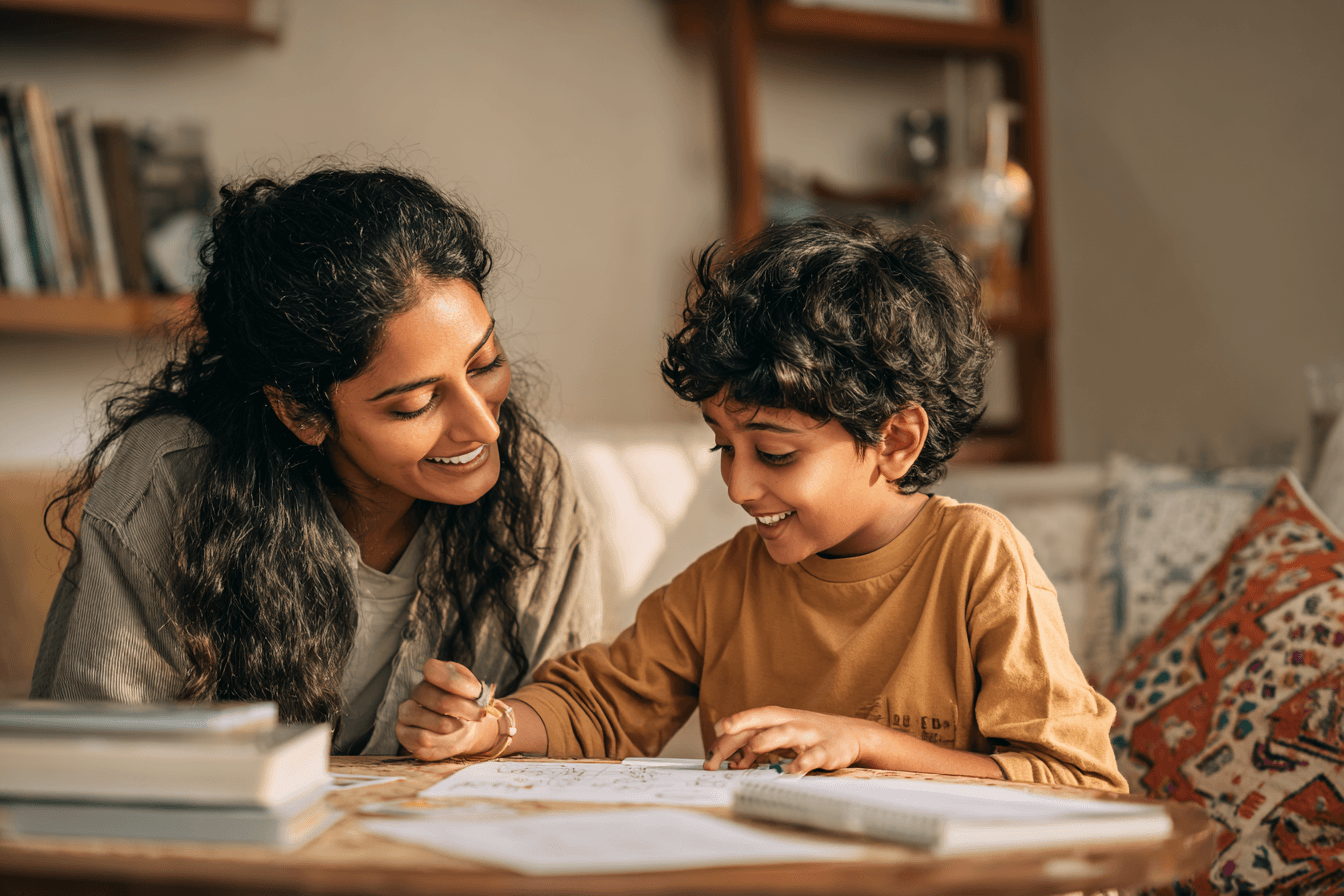Simple Tips for How to Learn English at Home for Kids

Learning English is about more than exams. It is about confident speaking, creative writing, and storytelling. If you are searching for tips for how to learn English for your child, the most effective way is through regular speaking, writing, and interactive practice.
At PlanetSpark, kids naturally improve their English through online public speaking classes, creative writing programs for kids, and storytelling programs for kids. Each child follows a personalised learning roadmap, building grammar, fluency, vocabulary, and body language skills through daily practice and AI-powered feedback.
Top Tips for How to Learn English for Kids
Make Speaking Part of Daily Life
Children pick up a new language much faster when they hear and speak it regularly. English should become part of your child’s daily routine, not just something reserved for school. Try simple activities like:
- Asking your child to tell short moral stories in English during dinner or bedtime
- Joining online storytelling classes where they can practise narration and voice modulation
- Encouraging participation in fun activities like debate clubs or podcasting sessions to build speaking confidence
These small, everyday conversations create a natural environment for learning. The more your child speaks, the more comfortable and fluent they’ll become.
The earlier they start, the easier it becomes. Start your child’s spoken English journey today with expert-led classes designed for kids.
Book Your Free Demo Class Here!
Build a Writing Habit
Writing helps kid organise their thoughts, express creativity, and become better communicators. You can start by:
- Giving your child a special notebook or digital diary to write stories, poems, or daily reflections
- Encouraging them to share their writing with you, siblings, or teachers for feedback
- Helping them note down new words or phrases they’ve learned during the day
This daily writing practice sharpens their language skills over time. When kids write regularly, they naturally become better speakers too.

Use Technology for Feedback and Practice
Today’s children are comfortable with screens, so why not use technology to help them practise English? Tools like speech recording apps, video feedback platforms, and AI-led language coaches can make a big difference. Try activities like:
- Recording your child telling a story or giving a small speech, then watching it together to notice strengths and areas to improve
- Using apps that offer real-time pronunciation tips or grammar corrections
- Rehearsing school presentations or recitations at home with the help of tech tools
This not only builds language skills but also boosts self-confidence.
When children see their progress, they become more eager to learn.
Turn Learning Into a Game
Children love to play, so why not turn English practice into something fun? Learning games can teach everything from spelling to sentence building. Try:
- Spelling games like word knockouts or flashcard races
- Vocabulary challenges with antonyms, synonyms, and fun quizzes
- Grammar puzzles that reward kids for getting the rules right
Games keep kids engaged without pressure or boredom. When learning feels playful, practice becomes something they look forward to.

Learning is easier when it feels like play.
See how interactive games and real-life speaking practice can make English fun for your child. Book a Free Demo Class Today
Read More Stories Together
Reading is one of the best ways to help children learn English naturally. It exposes them to new vocabulary, sentence structures, and ideas. You can:
- Read short moral stories for kids aloud together, switching roles between reader and listener
- Discuss the characters and plot in English to build comprehension and critical thinking
- Explore creative writing eBooks or grammar storybooks to mix fun with learning
Reading time also strengthens your bond as a family. When stories become part of your daily routine, learning English feels like an adventure.
Stay Involved with Your Child’s Progress
No learning journey is complete without support from parents. Stay connected to what your child is learning by:
- Setting small, achievable goals for speaking, writing, and reading each week
- Celebrating milestones, like learning five new words or telling a story without help
- Offering gentle feedback and encouragement, even when mistakes happen
Children thrive when they know someone believes in them. With your guidance, your child will grow into a confident communicator over time.
Why Learning English Is Essential for Kids Today
For many families in urban India, English isn’t just another school subject. It is the language of everyday life and future success. From school projects to online interactions, children use English to express ideas, make friends, and explore the world around them.
Building English skills early helps kids:
- Participate in school presentations, recitations, and storytelling competitions with confidence
- Communicate clearly in English at home, during playdates, and in group activities
- Perform better in interviews, Olympiads, and competitive exams where English is often the medium
- Build leadership and teamwork skills by taking part in debates, podcasts, and collaborative projects
- Explore global content online by watching educational videos, reading books, and playing games that spark curiosity
But here’s the challenge: Textbooks alone don’t teach children how to communicate naturally. Memorising grammar rules is important, but it does not help kids when they need to speak fluently or write creatively in real life.
That is why it is essential to combine practical, everyday learning with fun activities that make English feel natural. Whether it is telling a bedtime story in English, writing a journal entry, or practising a speech for class, small daily habits help children learn faster and retain more.
The goal is to build not just language skills, but also the confidence to use them freely.
Start your child’s journey to fearless English speaking in a supportive, interactive setting. Book a Free Demo Class today!
Why Spoken English Matters for Kids
Have you ever noticed how often children need to speak English in their everyday lives? Whether they are answering questions in class, chatting with friends online, or participating in a school event, confident spoken English makes a big difference. It helps kids express their thoughts clearly, build social connections, and prepare for future opportunities.
Simple daily activities like storytelling, word games, or casual English conversations at home can help build this skill naturally. Some parents also choose guided programs that focus specifically on spoken English for kids. If you’d like more ideas, this guide on spoken English for kids shares useful tips and techniques.
Ready to help your child speak English confidently?
Book a free spoken English class and see how practice can turn into progress.

Why PlanetSpark Is the Best Choice for Learning English
Most English programs focus only on reading and writing. But real communication means being able to speak confidently, express ideas clearly, and handle everyday conversations. This is where PlanetSpark makes a difference.
At PlanetSpark, children learn English through real-life activities. They practice speaking, writing, and presenting in ways that feel natural and enjoyable. With personal coaching, interactive tools, and daily practice, English becomes a part of their routine, not just a school subject.
| PlanetSpark Features | How They Help Your Child |
|---|---|
| 1:1 Personal Trainers | Personalised guidance in speaking and writing |
| SparkX AI Feedback | Video analysis of body language, tone, and grammar |
| Gamified Learning | Fun games to build vocabulary, spelling, and grammar |
| Daily Practice Tools (SparkBee) | Quizzes to reinforce learning every day |
| Learning Clubs | Social practice through debates, storytelling, and podcasts |
| Spark Diary | Daily writing practice to build grammar and creativity |
| Contests and Showcases | Public performances to build confidence |
| Sparkline Platform | A safe space to share speeches and stories with peers |
Conclusion
Learning English is more than just memorising grammar or writing essays. It’s about helping children find their voice, express their thoughts clearly, and build the confidence to speak in any situation. With the right support and consistent practice, kids can develop communication skills that will help them succeed in school and beyond.
If you’re ready to help your child start this journey, now is the perfect time.
The best way to learn a language is to start speaking it. Book a Free Demo Class with PlanetSpark Today
Frequently Asked Questions
What are the best tips for how to learn English for kids?
Encourage daily speaking, storytelling, and writing. Use fun tools like PlanetSpark’s gamified learning and AI-led practice for better results.
Can my child learn English speaking online?
Yes. PlanetSpark’s online public speaking classes help kids practice English speaking with expert trainers and AI feedback tools.
How does PlanetSpark help kids write better in English?
With the Spark Diary and creative writing for kids programs, PlanetSpark helps children write stories and improve grammar daily.
How do I track my child’s English progress?
PlanetSpark provides progress reports, PTMs, and video feedback to show improvements in grammar, vocabulary, and confidence.
Are PlanetSpark’s classes suitable for shy children?
Yes. The 1:1 personal trainers and safe sharing platforms help shy kids build confidence in a supportive environment.
